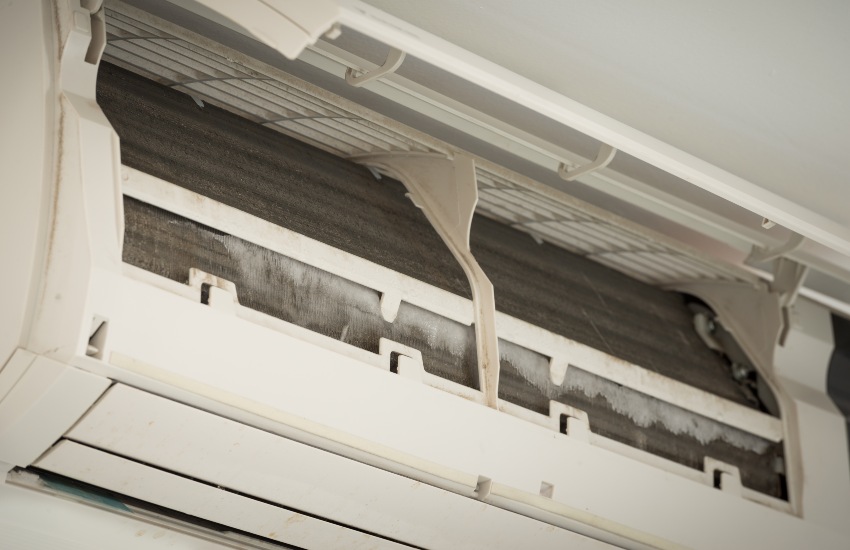Why Does Ice Form on Air Conditioning Coils?

Air conditioning is a staple in many homes and businesses, providing comfort during the hot summer months. However, these systems can sometimes experience problems like ice forming on the evaporator coil. This reduces system efficiency and can lead to costly repairs if left unchecked. First Call Heating & Cooling, a trusted local HVAC service provider in Portland, OR, is here to help you understand why ice forms on air conditioning coils and how to prevent and address the underlying issues.
Causes of Ice Formation on Air Conditioner Coils
The indoor portion of your air conditioning system includes an evaporator coil. This contains cold, liquid refrigerant ready to absorb heat from the indoor air. If something interferes with this heat transfer process, the coil may freeze. A dozen different culprits may be to blame, but the most common ones include:
- Low refrigerant: An insufficient refrigerant charge can reduce the pressure inside the coil, causing it to freeze.
- Dirty air filter: A clogged air filter restricts airflow, preventing the refrigerant from absorbing sufficient heat and causing ice to form.
- Faulty fan motor: A malfunctioning fan is another cause of low airflow, causing the evaporator coil temperature to drop below freezing.
- Dust on the coil: Accumulated dust acts as an insulating layer, reducing heat transfer and causing ice formation.
- Clogged condensate line: A blocked drain line allows condensation to cling to the coil, which can freeze if other adverse conditions exist.
- Malfunctioning thermostat: Faulty wiring or improper thermostat settings may cause the air conditioner to run continuously, overworking the system and leading to a frozen evaporator coil.
Why does it matter if ice forms on AC coils? Consider some of the negative effects this can have:
- Decreased cooling performance: As ice insulates the coil, less heat transfer occurs with the refrigerant inside, resulting in diminished cooling performance.
- Reduced energy efficiency: Ice buildup hinders the cooling process, forcing the system to work harder and consume more energy, even as performance diminishes.
- Potential damage to the system: Ice formation can lead to water damage, coil damage, or complete system failure if not addressed promptly.
Signs of Ice Formation on Air Conditioning Coils
You’re bound to notice something’s wrong if ice forms on the evaporator coil. Here are the signs to watch out for:
- Reduced airflow: When ice buildup blocks the evaporator coil, it restricts airflow, decreasing efficiency and causing comfort problems throughout the house.
- Warm air blowing from the vents: Because heat transfer is impaired, the air conditioner pumps warm air into your home instead of cool air.
- Visible frost or ice buildup: The most obvious sign that ice has formed on the evaporator coil is visible frost or ice buildup.
Scheduling routine HVAC maintenance is the best way to identify and address ice formation before it causes more serious problems. If you notice these signs of ice buildup, confirm your suspicions by checking for visible frost on the evaporator coil. If you see any, turn off the system immediately and contact First Call Heating & Cooling to prevent further damage.
Prevent and Repair Ice Formation on Air Conditioning Coils
Follow these prevention strategies to prevent ice buildup in the future:
- Regularly change the air filter to maintain proper airflow.
- Clean the condensate drain line to prevent blockages.
- Measure the refrigerant charge and fix leaks promptly.
- Avoid setting the thermostat lower than 72 degrees to prevent continuous operation in hot weather.
If it’s too late and ice has already formed on the evaporator coil, follow these steps:
- Turn off the AC unit.
- Allow the ice to melt. You can speed up this process by running the HVAC system in fan-only mode or using a hairdryer on the evaporator coil.
- Contact First Call Heating & Cooling to have a qualified technician identify and address the underlying cause of the ice buildup.
- Take corrective actions to prevent future ice formation problems.
First Call Heating & Cooling offers the services you need to prevent and repair ice formation on air conditioning coils, including:
- HVAC maintenance plans
- Expert diagnostic equipment and techniques
- Comprehensive AC repair services
- Prompt and reliable assistance to keep your air conditioner running
Contact First Call Heating & Cooling for Air Conditioning Service in Portland
Preventing and addressing ice formation on the evaporator coil is crucial for maintaining air conditioner efficiency, performance, and longevity. At First Call Heating & Cooling, we recommend regular maintenance, prompt diagnostics, and swift corrective actions to keep your system running smoothly. For further guidance or assistance with the cooling system in your Portland home, please contact us at 503-231-3311 for professional, reliable air conditioning services.
